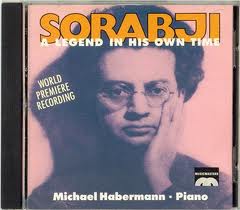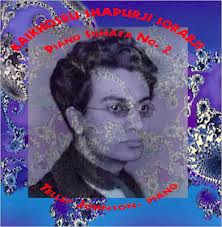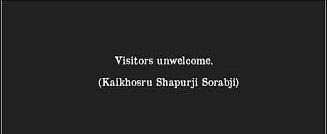Kaikhosru Shapurji Sorabji
This is a collection of articles archived for the excellence of their content. Readers will be able to edit existing articles and post new articles directly |
Contents |
Mr Miseryguts
Sorabji wrote the world's longest piano piece, launched vicious attacks on his colleagues, then forbade performances of his work. Steven Poole on the life of a reclusive genius
The Guardian, Friday 12 September 2003
Kaikhosru Shapurji Sorabji
Mania for privacy: Kaikhosru Shapurji Sorabji
He was notorious as the Howard Hughes of music. Cut off from the world and supported by a private income, he composed dauntingly huge pieces which were regarded as all but unplayable. He forbade the performance of his music lest inferior musicians ruin it. He remained alone, despising the trivial productions of others, in his artistic castle of ideal, Platonic complexity, a lone voice in the wilderness until his death.
Such, at least, is the legend that surrounds one of the most intriguingly strange of English composers, Kaikhosru Shapurji Sorabji. The facts, as usual, are more nuanced. In 2003 pianist Jonathan Powell undertook the Herculean labour of performing what many regard as Sorabji's masterpiece, the four-hour piano work Opus Clavicembalisticum (1930), by some distance the longest piece in the piano literature.
Early life
The composer was born Leon Dudley Sorabji in Chingford on August 14 1892. His father was an Indian Zoroastrian, his mother Spanish-Sicilian. He showed exceptional gifts as a pianist at a young age, and as a composer was largely self-taught. He changed his name to Kaikhosru Shapurji to reflect his Parsee heritage, and always resisted being identified as a British composer, though he lived in this country throughout his life, in London and later in Dorset.
The corpus of Sorabji’s work
Sorabji's 111 extant compositions, dating from between 1914 and 1984, include piano solos, orchestral works, songs, string trios, quartets, quintets and much else. His artistic idols were Bach, Liszt, Szymanowski and especially Busoni. He was fond of maximalist structures: his Messa Grande Sinfonica (1961) is 1,001 pages long. The core of his repertoire, however, is usually thought to be the piano music.
Works such as the Toccata No 1 (1928) demonstrate an almost fractal interplay between microscopic and macroscopic: Baroque structures such as the fugue and passacaglia are reworked and interwoven with dizzyingly complex virtuosity, while the inexorable large-scale structure (the work lasts 75 minutes), with its immensely long, unwinding melodic lines, persuades the listener of an almost religious necessity to every note.
Sorabji's sound-worlds, with their highly idiosyncratic mixture of solemnity and exoticism, do not fit into any general idea of "English music", either; critic Marc-André Roberge has written that his work "often fuse[s] the decorative features of romantic and postromantic piano writing with the ornamental luxuriance of oriental art".
A music critic
From the 1920s to the 1940s, Sorabji also worked as a critic for music journals. He championed the work of composers little-known in England at the time, such as Scriabin, Busoni and Mahler (the latter in an especially prophetic way, given the later flowering of the Mahler cult). But as a writer he was most famous for his marvellously acidic attacks on composers and works he hated (Stravinsky, Ravel's G major Piano Concerto) and more or less everything else about English musical culture.
A vitriolic pen
Here is one characteristic gush of finely targeted critical vitriol, in Sorabji's hugely enjoyable style: "The astonishing production of Cyril Scott... underneath its trumpery finery of ninths, elevenths, added sixths, joss-sticks, papier-Asie orientalism and pinchbeck Brummagem-Benares nick-nackery, oozes with glutinous commonplace. Works like this always remind one of those spurious 'liqueur' chocolates grandly labelled 'Grand Marnier', 'Maraschino', 'Benedictine', leading one to expect the delicious gastronomic sensations the incomparable marquis knows so well how to excite, but which are found actually to yield a horrid sickly sugary concoction - insipid and nauseating."
It is perhaps hardly surprising, given the vim with which he wielded his critical flail, that Sorabji was not the most popular or gregarious figure in mid-century musical England, and perhaps hence derives his reputation for crotchety isolation. It is true that he described himself as having a "mania for privacy", and he wrote, doubtless with no little ironic self-awareness, that he lived in a "Tower of Granite, with plentiful supplies of boiling oil and molten lead handy to tip over the battlements onto the heads of unwanted and uninvited intruders". One legend even relates that he posted a sign on his front door which read: "Certain nuns welcome; all others not."
”Not anti-social”
But none of this quite makes Sorabji the mad misanthrope of myth. "He was very private and pretty reclusive," says Powell, "but he was not anti-social. He had quite a number of close friends over many decades - he knew Sacheverell Sitwell for 70 years. The problem is that this reputation can infect one's opinion of his music: if he was this cold, inhuman figure, one could think that the work is also inhuman, which it isn't."
Opus Clavicembalisticum and the ban by its composer
Inhuman it certainly is not, but one might call it superhuman, in the extraordinary demands it makes. In 1936, pianist John Tobin played part one of Opus Clavicembalisticum, in a performance that was by all accounts inadequate. Sorabji was not present, but what he heard about the occasion distressed him. He thus imposed his notorious performance ban, forbidding public playing of his works without his express consent. "No performance at all is vastly preferable to an obscene travesty," he wrote.
According to Powell: "Sorabji thought performance was a celebration - a rite rather than an act, which is probably what put him off having his music played in concert halls, especially given the circus-like atmosphere of British concert halls in the 1940s and 1950s." Eventually, in the late 1970s, Sorabji gave his blessing to pianists Yonty Solomon and Michael Habermann, who began to perform some of his pieces, and thus began the eventual slow journey into the light of Sorabji's secret oeuvre.
Of the Opus Clavicembalisticum itself, Sorabji wrote sternly: "The work is only intended for pianist-musicians of the highest order. Indeed, its intellectual and technical difficulties place it beyond the reach of any others - it is a weighty and serious contribution to the literature of the piano, for serious musicians and serious listeners only."
On its completion on June 26 1930, Sorabji wrote to his friend Erik Chisholm: "With a wracking head and literally my whole body shaking as with ague I write this and tell you I have just this afternoon early finished Clavicembalisticum... The closing 4 pages are so cataclysmic and catastrophic as anything I've ever done - the harmony bites like nitric acid - the counterpoint grinds like the mills of God..."
Cult
Powell's acquaintance with this Everest of piano music extends over half his life, and he prepared "seriously" for the September 2003 performance since February. The Guardian critic asked him how he would describe the piece, and he laughed. "That's like saying, 'How would you describe the world?'"
Since the mid-1980s, when Sorabji was alive, there has been something of a growing cult around Sorabji, who died in 1988. More and more recordings are being made for the first time, and there is even an internet blog by an American music student detailing his year-long efforts to correct and transcribe the manuscript of the Sonata Opus VII for piano. Sorabji may have ended up writing mainly for himself and an imagined posterity, but the sun is gradually rising over the extraordinarily rich and complex worlds he created.
Jonathan Powell performed Opus Clavicembalisticum in September 2003 at the Purcell Room, London SE1.



